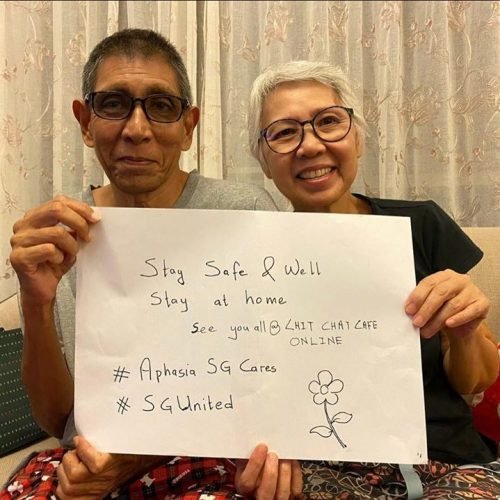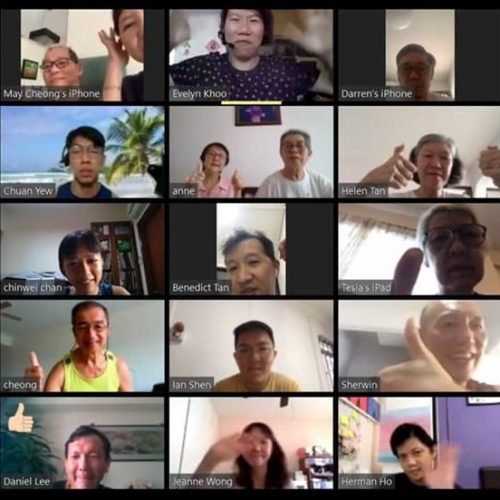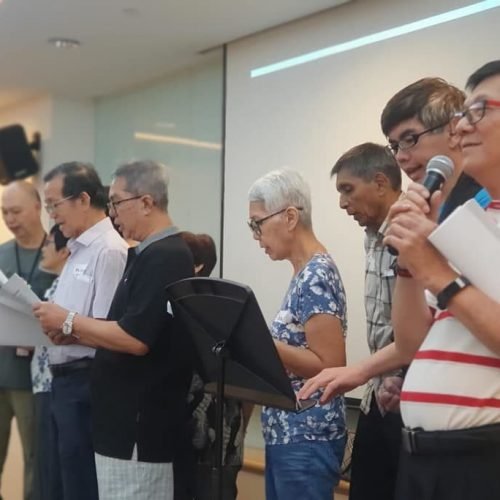Retired couple Anthony and Tesia’s daily routine sounds nothing less than a mini food adventure.
The pair will hop on the train to visit a new neighbourhood to find their next favourite local delight and end their lunch jaunt with a coffee break.
These lunch outings are probably the most exciting adventure that the couple can enjoy since Tesia, 65, removed a tumour from her brain in 2018.
No Signs, No Warning
The pair recounted: “Tesia collapsed at home one day without warning. We quickly called an ambulance and got her admitted into Ng Teng Fong Hospital.”
Anthony, 69, continued: “She was placed in the Intensive Care Unit (ICU) for the next five days, and doctors informed my son and I that Tesia had a brain tumour. We were extremely worried and shocked at the diagnosis as she had no prior complaints of feeling unwell.
“After two operations, Tesia’s health became weak and she was not able to speak for a long time. She knows who our family members are, but she could not pronounce our names,” he shared.
After removing the brain tumour, Tesia acquired a communication disorder called aphasia, which impacted her speech and word-finding abilities.
“As the days progressed, she grew stronger and so did her voice. When she had difficulty finding the right words, we helped her by guessing and gave her a tablet to use – but she found it too troublesome,” Anthony laughed.
Adding Some Fun In Recovery
As Tesia’s primary caregiver, Anthony made sure she keeps up with her speech therapy exercises and continuously motivates her to practise.
He advised: “A person with aphasia needs encouragement. Start with things that are familiar and help your loved one out. The family members have to be patient and understanding of the person’s capabilities and manage their expectations.”
To make the exercises fun, the couple, who have been married for 38 years, came up with their own speech and language games. They started by naming things around the house and later ventured out to the supermarket to expand Tesia’s vocabulary.
Tesia, 65, shared: “I was sad when I could not get the words out. Now, I feel more positive as I am more used to it.” With the hopes of finding more holistic care for his wife, Anthony started looking for support groups and found out about the free activities offered at Aphasia SG.
Started as a ground-up initiative, the non-profit organisation offers free community programmes such as Chit Chat Café, Aphasia SG Choir, and virtual activities to provide persons with aphasia and their caregivers an opportunity to meet other families affected by the communication disorder.
As the programmes are conducted by trained volunteers, it provides a safe space for the participants to practise talking while having meaningful supported conversations.
Anthony said: “We found out about the group through the papers and was recommended by a friend to join. We started attending Chit Chat Cafe just before their first anniversary in late 2019. We like the environment where we can talk and have drinks and snacks.
“I also attended the caregiver session, where we shared our challenges and came up with ideas together to overcome them. Later on, we joined the choir as we heard that singing could help improve speech capabilities,” he added.
“Seeing other participants who have trouble speaking or grasping the words motivated us to keep up with our daily practice. Now, we add in simple exercises like reading a paragraph from a book or write down what we did or ate that day,” they shared.






Another Challenge Unfolds
As the pair added new activities into their recovery journey, an unexpected setback disrupted Tesia’s progress.
Anthony shared: “A year later after her operations, she started to have seizures and had to take medications to control them. We had to learn to spot the onset of seizures like shaking in the body or face, and to ascertain if the situation required medical attention.”
Due to this new symptom, Anthony and Tesia had to adapt their routines and forgo travel plans and outings such as watching movies as flickering lights can be a trigger source.
“We wanted to do some short travels but decided against it as the seizures may happen every three to four months. Instead, we go to the park, do less strenuous activities and enjoy each other’s company,” Anthony explained.
“We also had to tweak our daily routine as the new medicine made Tesia more tired, and she may need to take naps in the afternoon. But we still keep practising to keep the momentum going.
“Experiencing this illness has been a learning curve for us…when the seizure hits, it is like a restart button – we have to relearn the words again.
“But that is not a problem as her memory* has always been better than mine,” he smiled.
Editor’s footnote:
Aphasia is an impairment of language, not intellect.
A person with aphasia (PWA) may have difficulty finding the right words to express himself/herself, but he/she is able to recall “things” e.g. persons, faces, places.
Due to the PWA’s communication difficulties, people sometimes perceive them to be less intelligent or able. This is a misconception.

